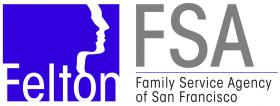Program Description
Felton Institute’s Early Psychosis programs (formerly PREP) were originally developed in partnership with the University California San Francisco (UCSF). The Felton Early Psychosis Model specializes in psychosis early detection and intervention with a multi‐disciplinary approach to treatment. Our program model combines evidence‐based practices including Cognitive Behavioral Therapy for Psychosis (CBTp), Strengths‐Based Care Management, Multi‐family Group Therapy, Peer Support, Algorithm-Based Medication Management, Individual Placement and Support (IPS) model of supported education and employment, and access to Cognitive Remediation Training to address issues early and get people back on track to a fulfilling life as quickly as possible. The model is being expanded into a new component (BEAM) to provide early intervention services for individuals with psychosis and mood disorders. We provide excellent training and workforce development and is poised for growth with new opportunities afforded by the expanding field of early psychosis. Funded through partnership with respective county behavioral health departments, Felton implements evidence-based practices with outcome driven fidelity measures, and currently operates sites in four counties: San Francisco, Alameda, San Mateo, and Monterey.
Position Overview
The Early Psychosis Services Associate Director provides clinical, program operations, and quality assurance oversight for the Early Psychosis Division. The Associate Director participates as a member of the early psychosis leadership team, providing input in policies and procedures to ensure our programs in meet their performance objectives and quality assurance needs. This position supports fidelity monitoring and consistency of the Felton Early Psychosis Model across sites, as well as the pursuit of funding opportunities to expand services. Local travel between agency sites expected. This position reports directly to the Director of the Early Psychosis Division.
Specific Duties and Responsibilities (Essential Functions)
- Provide clinical and operations oversight for all program sites within the Early Psychosis Division, including consultation and guidance on complex clinical, legal and ethical issues
- Step in for absent program managers in the management and operation of program sites, fulfilling all essential functions of a program manager during transitions
- Provide direct supervision of program managers, as well as supervision towards licensure when needed, and collaborate with Division Director in performance evaluations
- Provide clinical leadership to the interdisciplinary teams, including collaborating with the medication support team of psychiatrists and psychiatric nurse practitioners
- Provide direct oversight of referral and intake system, monitoring referrals, intakes, and caseloads across sites and collaborate directly with program managers to resolve issues regarding intake flow, caseloads, and referrals
- Monitor clinical performance across sites, including fidelity to evidence based practices and QA compliance, and develop corrective plans as needed
- Attend Operations Meetings, lead regular chart review processes at all sites to ensure compliance with documentation requirements for all funding streams and provide regular status report to Division Director
- Responsible for managing the maintenance of records and other administrative requirements and coordinates responses to audits and inspections
- Ensure that all sites maintain compliance with all research protocols and evidence based practices fidelity measures
- Collaborate with leadership team to implement the Felton early psychosis model in accordance with fidelity measures and strategic development plans
- Responsible for the implementation and development of clinical policies and procedures, in collaboration with Division Director, Quality Assurance Director, Program Managers, and other members of the early psychosis leadership team
- Provide individual and group supervision to interns and other program staff accruing clinical experience and hours for professional licensure where needed
- Actively engage in Felton early psychosis outreach campaign and liaison with other Felton departments regarding media campaign, outreach materials, and facilitate community involvement and/or advocacy.
- Participate in delivery of training and/or program presentations as appropriate
- Utilize operational knowledge of Felton early psychosis programs to identify and recommend strategic initiatives for program expansion as well as improve data collection methods
- Contribute to all relevant governance committee and operational meetings (early psychosis leadership meetings, steering committee meetings, research related meetings, and other meetings as assigned) and represent Felton early psychosis programs in stakeholder, county, and other meetings, as assigned
- Attend and participate in all assigned trainings for professional, program, and agency development
- Additional duties as needed
- Master’s Degree (or higher) in Social Sciences, Psychology, Counseling Psychology or related field AND current California State Licensure AND meets requirement to provide clinical supervision to BBS interns (two years post licensure plus completion of course requirements).
- Five years of supervisory experience in community mental health programs OR three years of supervisory experience in early psychosis program.
- Five years of experience providing mental health services to youth or young adults with serious mental health challenges OR two years of direct service experience in early psychosis program.
- Personal or family experience of overcoming mental health challenges highly desirable.
- Demonstrated proficiency in Microsoft Word, Excel, PowerPoint, Outlook, SharePoint, and ability to type 45 WPM.
- Valid California Drivers’ License with an excellent driving record.
Medical, Dental, and Vision insurance (PPO or HMO options)
403(b) retirement plan
Employer paid life insurance
Employee Assistance Program
Flexible Spending Account (both medical and dependent care)
8 Paid holidays
21 days of Paid Time Off
